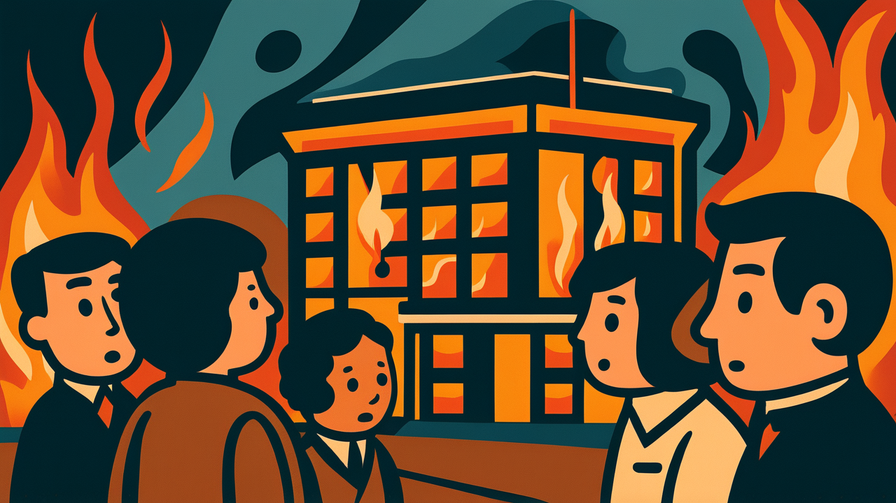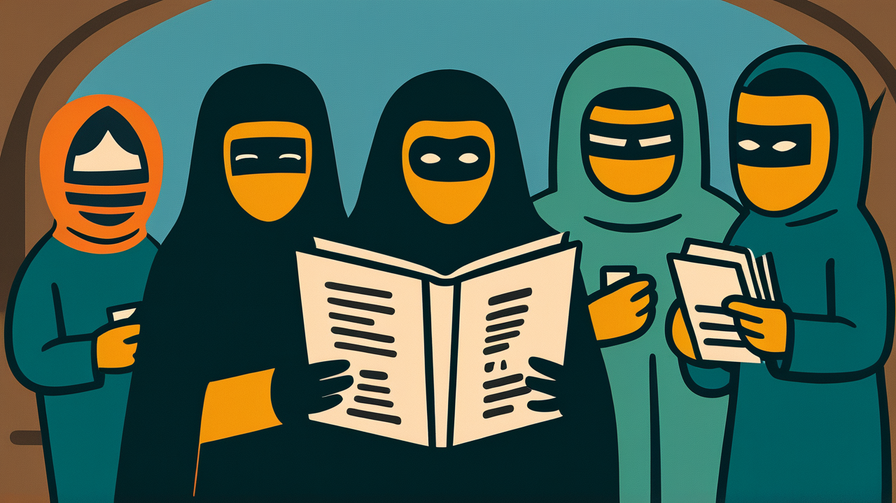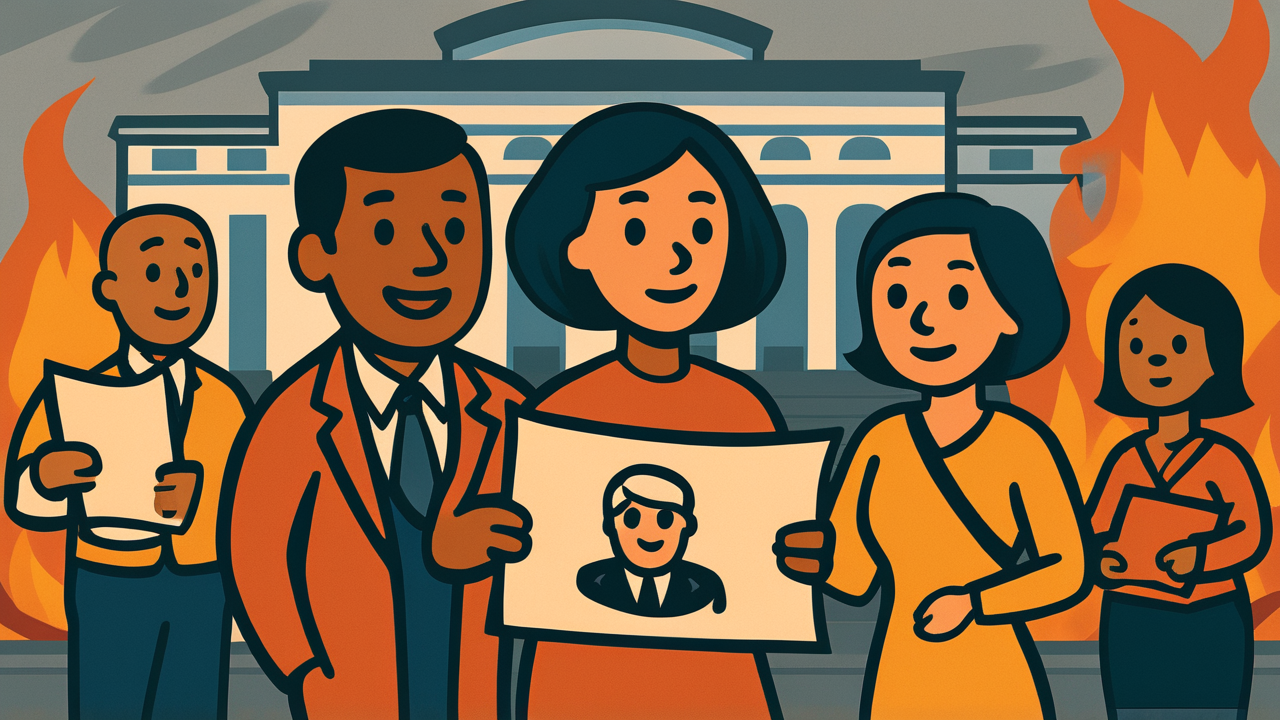[Disclaimer] This article is reconstructed based on information from external sources. Please verify the original source before referring to this content.
News Summary
The following content was published online. A translated summary is presented below. See the source for details.
Turkey’s culture wars just got more intense, connecting a horrific event from 1993 to today’s crackdown on comedy and satire. It all starts with the Madımak tragedy – imagine 37 artists, writers, and musicians trapped in a burning hotel while an angry mob outside prevents firefighters from saving them. This happened in Sivas, Turkey, when extremists attacked a cultural festival. Fast forward to now: LeMan, Turkey’s version of Charlie Hebdo or The Onion (but in magazine form), faces constant pressure, fines, and threats for making jokes about politics. The connection? Both represent the ongoing fight between those who want free expression and those who want to control what people can say, think, or laugh about. The same mindset that led to attacking artists in 1993 now targets comedians and satirists. LeMan’s cartoonists face court cases for drawing politicians in unflattering ways. Some issues get pulled from shelves, and editors receive death threats. It’s like if Saturday Night Live writers got arrested for their skits – except it’s really happening in Turkey.
Source: globalvoices
Our Commentary
Background and Context

To understand Turkey’s culture wars, you need to know about the Madımak massacre – one of Turkey’s darkest moments. On July 2, 1993, a mob of religious extremists surrounded the Madımak Hotel in Sivas, where artists were celebrating Alevi culture (Alevis are a religious minority in Turkey). They set the hotel on fire while people were trapped inside. 37 people died, including teenagers. The attackers were angry about a writer who had translated Salman Rushdie’s “The Satanic Verses.” This tragedy became a symbol of violence against free expression. Today’s comedy magazines like LeMan carry on the tradition of those artists – using humor and satire to criticize power and defend freedom. But they face similar hatred from those who can’t handle criticism or different viewpoints.
Expert Analysis
Cultural experts see Turkey’s situation as a test case for democracy worldwide. When governments can’t handle being laughed at, it’s usually a bad sign for freedom. LeMan magazine uses humor as resistance – their cartoons often go viral on social media even when the physical magazine gets banned. This is powerful because humor breaks down fear. Dictators hate being laughed at more than being criticized seriously. The connection to Madımak is clear: both represent artistic expression that challenges authority. The difference now is that social media makes censorship harder. When Turkey bans a cartoon, it gets shared millions of times online. This creates a weird situation where trying to silence comedy makes it louder.
Additional Data and Fact Reinforcement
The numbers tell a scary story: Over 200 journalists and cartoonists have faced legal action in Turkey in the past 5 years for “insulting” public officials. LeMan has paid over $500,000 in fines. Turkey ranks 165th out of 180 countries in press freedom – that’s worse than Russia. The Madımak site was controversially turned into a “science center” instead of a memorial, angering victims’ families. Meanwhile, political satire magazines saw circulation jump 40% as people sought alternative voices. Young Turks increasingly get news from comedy shows and satire sites rather than traditional media. Social media comedians with millions of followers face regular account suspensions. Some cartoonists now publish under fake names to avoid prosecution.
Related News
This isn’t just Turkey’s problem. Comedians worldwide face increasing pressure – from Russia jailing comics for Ukraine jokes to Chinese stand-ups disappearing after political sets. The Charlie Hebdo attacks in France showed how extremists target satire globally. In Turkey specifically, the government recently made Grok (an AI chatbot) the first AI to be censored for making jokes about politicians. Netflix and other platforms self-censor Turkish content to avoid bans. Even historical comedy shows get pulled if they mock past leaders. The irony? Turkish comedy shows are hugely popular across the Middle East, showing people’s hunger for content that pushes boundaries.
Summary

From the ashes of Madımak to the pages of LeMan, Turkey’s culture wars show the ongoing battle between creative expression and authoritarian control. What started with physical violence against artists in 1993 continues today through legal harassment of satirists, proving that some people still can’t handle being laughed at. For young Turks, comedy magazines and satirical content aren’t just entertainment – they’re acts of resistance in a country where speaking truth to power can land you in jail.
Public Reaction
Turkish Twitter becomes a digital gallery every time LeMan gets censored, with people sharing banned cartoons using VPNs and coded language. Young Turks organize “comedy protests” where they read satirical magazines in public spaces. International cartoonists draw solidarity pieces that go viral. Some brave coffee shops display banned magazine covers as “art.” Parents worry about their kids getting in trouble for sharing memes. Opposition politicians quote LeMan cartoons in parliament, giving them legal protection. Celebrities face backlash – support the magazines and risk government anger, stay silent and disappoint fans. The Madımak families appreciate how young satirists keep their loved ones’ spirit alive through fearless creativity.
Frequently Asked Questions
Q: Why was the Madımak hotel attack so significant?
A: It was the deadliest attack on artists and intellectuals in modern Turkish history. The victims were celebrating culture peacefully when extremists burned them alive. It showed how dangerous fanaticism can be when it targets free expression, and many see today’s censorship as a continuation of that mindset.
Q: Is it really illegal to make fun of politicians in Turkey?
A: Technically, “insulting” public officials is a crime punishable by jail time. This vague law gets used against comedians, cartoonists, and even regular people who post memes. Imagine getting arrested for sharing a funny TikTok about the president – that’s the reality there.
Q: How do young Turks access banned content?
A: VPNs are super popular (though the government tries to ban those too). People share screenshots on encrypted apps, use coded language on social media, and find creative workarounds. It’s like a constant game of digital cat-and-mouse between censors and citizens who just want to laugh.


